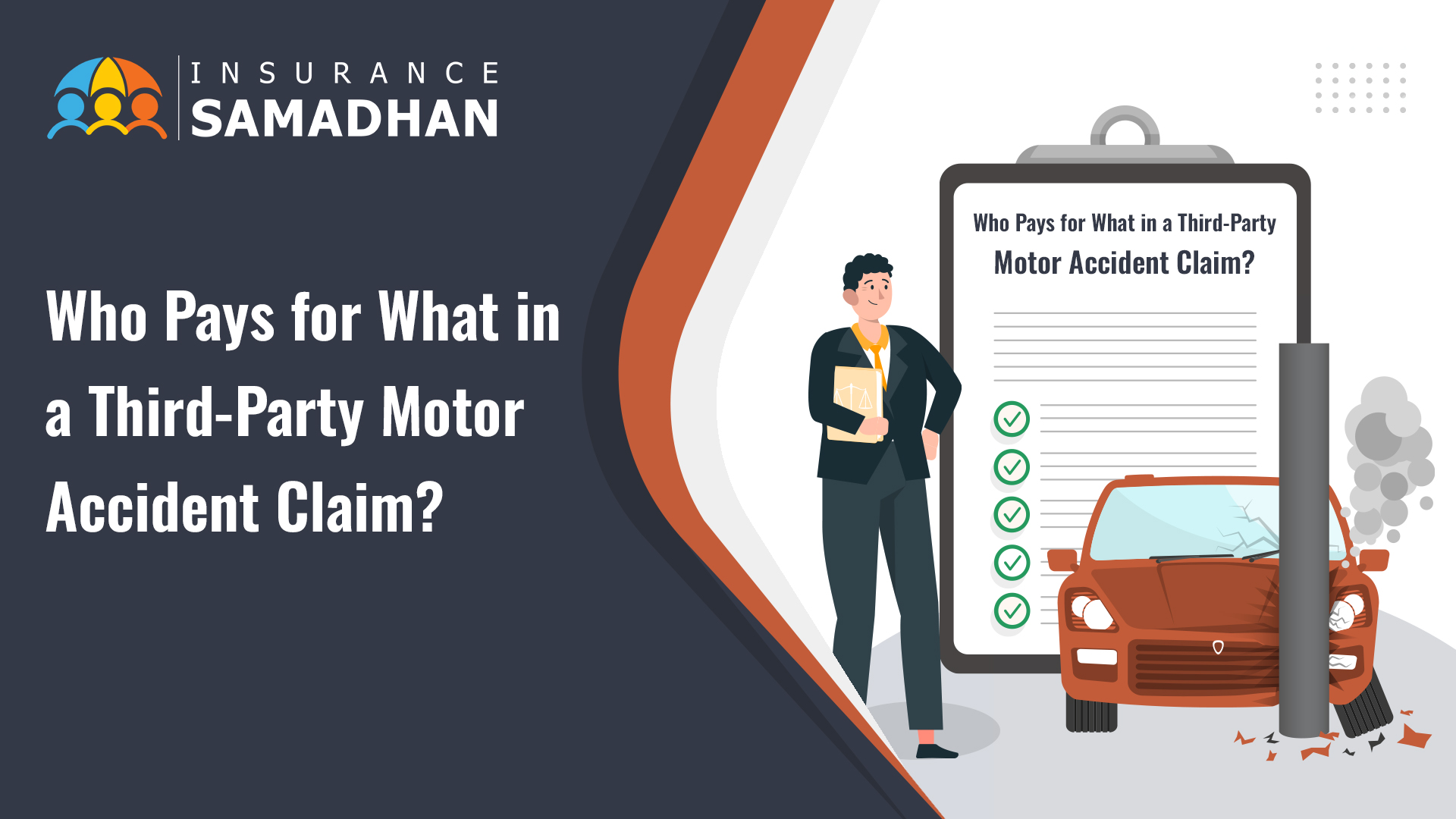Introduction
Third-party motor insurance is one of those things people often buy because it’s mandatory but don’t really understand until they’re in a messy road accident. Who pays the hospital bills? Who handles the car damage? And most importantly, who helps you when your motor accident claim is delayed or rejected?
At Insurance Samadhan, we’ve seen countless policyholders struggle with third-party motor accident claims, especially when they’re unsure about what’s covered and what’s not. This blog will break down how third-party insurance works, who pays for what, and what to do if you face an insurance claim rejection or delay.

What Is Third-Party Motor Insurance?
Third-party insurance also known as liability-only or act-only insurance is a basic yet legally required cover under the Motor Vehicles Act, 1988. It’s designed to protect others (not you) if your vehicle causes:
a) Bodily injury
b) Property damage
c) Death
Simply put, it covers others’ losses, not your own. If you hit someone’s car or injure a pedestrian, your insurer pays the third party on your behalf up to the limits set by law and your policy.
Understanding the Key Parties
Let’s quickly understand the roles in such claims:
1. First Party: You, the policyholder
2. Second Party: Your insurance company
3. Third Party: The person who suffered injury, loss, or damage because of your vehicle
When a third-party claim is made, your insurer settles the claim directly with the third party, but the process can be long and often involves the Motor Accidents Claims Tribunal (MACT).
Who Pays for What?
Let’s break it down by expense category:
1. Medical Expenses or Injury Compensation
If your vehicle injures someone, third-party insurance can cover:
a) Hospitalisation bills
b) Surgery or rehab costs
c) Disability-related compensation
d) Death-related compensation to dependents
Example: If someone is injured in an accident you caused, your insurer might be liable to pay a compensation amount as determined by the court or tribunal. You don’t pay directly. Your insurer does, unless the claim exceeds policy limits.
2. Damage to Property or Vehicle
Third-party insurance also covers damage to someone else’s vehicle or property like a boundary wall or shop shutter.
Note: The limit for property damage claims is capped by the IRDAI. As of now, the cap is ₹7.5 lakh for vehicle or property damage, but any cost above that will have to be borne by you.
Example: If damage is assessed at ₹9 lakh, the insurer may cover ₹7.5 lakh, and you may have to pay the remaining ₹1.5 lakh.
3. Legal Costs and Tribunal Awards
If the matter goes to the Motor Accidents Claims Tribunal:
a) The tribunal reviews evidence, police FIR, medical records, etc.
b) If the court awards compensation, your insurer is expected to pay it within the policy limits
c) You may have to attend hearings or provide your side of the story
If the judgment exceeds what your policy covers, the excess must be paid by you.
What Does Third-Party Insurance Not Cover?
Here’s what you’ll be expected to pay from your own pocket:
a) Damage to your own car (you’ll need a comprehensive policy for that)
b) Accidents caused under the influence of alcohol or drugs
c) If you were driving without a valid license
d) Deliberate or fraudulent accidents
e) Use of vehicle for commercial or illegal purposes
Steps to File a Third-Party Motor Accident Claim
If someone else files a motor accident claim against you, or if you need to raise a claim against another driver, here’s the standard process:
1. File an FIR at the nearest police station
2. Inform your insurer as soon as possible
3. Collect and submit documents like:
a)Copy of FIR
b) Insurance policy document
c) Driver’s license
d) Vehicle registration certificate
4. Let the Motor Accidents Claims Tribunal handle the case
5. Cooperate with the court process and submit any additional documents if needed
What If the Claim Is Delayed or Rejected?
This is where many policyholders get stuck. Motor accident claim settlement through third-party insurance often takes time. And when claims are rejected or delayed, it’s usually due to:
1. Missing documents
2. FIR not filed in time
3. Conflicting versions of the accident
4. The insurer denying liability based on exclusions
If that happens, Insurance Samadhan can help.
How Insurance Samadhan Supports You
If you face an insurance claim rejection or an unnecessary delay, we can:
1. Help you understand your third-party policy coverage
2. Review your documents and guide you on what’s missing
3. Assist in drafting complaint letters to the insurance company or escalation to the IRDAI
4. Advise you on the best course of action if you feel the claim has been unfairly rejected
We’ve helped thousands of policyholders navigate claim-related challenges without promising unrealistic outcomes.
Final Thoughts
Third-party motor insurance plays a crucial role in protecting both you and others from financial harm in case of road accidents. But knowing who pays for what is key to avoiding nasty surprises.
Always read your policy carefully, file claims on time, and follow the legal process. And if things go sideways whether it’s a rejected claim, unfair denial, or just confusion over paperwork, Insurance Samadhan is here to guide you with clarity and confidence.
Click here to register your complaint with Insurance Samadhan
Visit our website: insurancesamadhan.com
Mail us at corporate@insurancesamadhan.com
